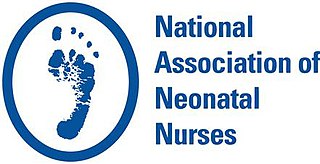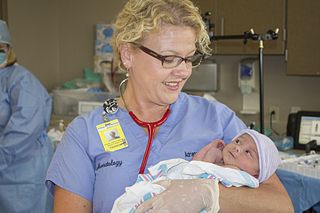The National Association of Orthopaedic Nurses (NAON) is an American non-profit volunteer-run professional association that aims to advance orthopaedic nursing. Formed in 1980, NAON was designed to promote the highest standards of nursing practice by educating its practitioners, promoting research, and encouraging effective communication between orthopaedic nurses and other groups with similar interests.
Nursing credentials and certifications are the various credentials and certifications that a person must have to practice nursing legally. Nurses' postnominal letters reflect their credentials—that is, their achievements in nursing education, licensure, certification, and fellowship. The letters usually appear in the following order:

Nursing in the United States is a professional health care occupation. It is the largest such occupation, employing millions of certified professionals. As of 2023, 3,175,390 registered nurses were employed, paid a median income of $86,070.
Patient advocacy is a process in health care concerned with advocacy for patients, survivors, and caregivers. The patient advocate may be an individual or an organization, concerned with healthcare standards or with one specific group of disorders. The terms patient advocate and patient advocacy can refer both to individual advocates providing services that organizations also provide, and to organizations whose functions extend to individual patients. Some patient advocates are independent and some work for the organizations that are directly responsible for the patient's care.

The Association for the Behavioral Sciences and Medical Education (ABSAME) was founded in 1975 as an interdisciplinary professional society dedicated to strengthening behavioral science teaching in medical schools, residency programs, and in continuing medical education. ABSAME traces its origins to four invitational conferences sponsored by the National Institutes of Health in 1969 and 1970. This group concluded their operations in 2017.

Neonatal nursing is a sub-specialty of nursing care for newborn infants up to 28 days after birth. The term neonatal comes from neo, "new", and natal, "pertaining to birth or origin". Neonatal nursing requires a high degree of skill, dedication and emotional strength as they care for newborn infants with a range of problems. These problems vary between prematurity, birth defects, infection, cardiac malformations and surgical issues. Neonatal nurses are a vital part of the neonatal care team and are required to know basic newborn resuscitation, be able to control the newborn's temperature and know how to initiate cardiopulmonary and pulse oximetry monitoring. Most neonatal nurses care for infants from the time of birth until they are discharged from the hospital.
The American Nurses Credentialing Center (ANCC), a subsidiary of the American Nurses Association (ANA), is a certification body for nursing board certification and the largest certification body for advanced practice registered nurses in the United States, as of 2011 certifying over 75,000 APRNs, including nurse practitioners and clinical nurse specialists.

Nursing is a health care profession that "integrates the art and science of caring and focuses on the protection, promotion, and optimization of health and human functioning; prevention of illness and injury; facilitation of healing; and alleviation of suffering through compassionate presence". Nurses practice in many specialties with varying levels of certification and responsibility. Nurses comprise the largest component of most healthcare environments. There are shortages of qualified nurses in many countries.
Ruth Watson Lubic, CNM, EdD, FAAN, FACNM, is an American nurse-midwife and applied anthropologist who pioneered the role of nurse-midwives as primary care providers for women, particularly in maternity care. Lubic is considered to be one of the leaders of the nurse-midwifery movement in the United States.
The Association of Women's Health, Obstetric and Neonatal Nurses (AWHONN) is a 501(c)(3) nonprofit membership organization. The stated purpose of AWHONN is to promote the health of women and newborns.

The Journal of Obstetric, Gynecologic, & Neonatal Nursing is a peer-reviewed nursing journal in the fields of obstetric nursing, women's health nursing, and neonatal nursing. It is the official scientific publication of the Association of Women's Health, Obstetric and Neonatal Nurses.
Obstetrical nursing, also called perinatal nursing, is a nursing specialty that works with patients who are attempting to become pregnant, are currently pregnant, or have recently delivered. Obstetrical nurses help provide prenatal care and testing, care of patients experiencing pregnancy complications, care during labor and delivery, and care of patients following delivery. Obstetrical nurses work closely with obstetricians, midwives, and nurse practitioners. They also provide supervision of patient care technicians and surgical technologists.

The National Association of Neonatal Nurses (NANN) is a professional organization for neonatal nurses in the United States. NANN was founded in 1984 by five neonatal nurses: Patricia Johnson, Linda Bellig, Tracy Karp, Charles Rait and Donna Lee Loper. Within one year, the association boasted a membership of 3,790.
AcademyHealth is a nonpartisan, nonprofit professional organization dedicated to advancing the fields of health services research and health policy. It is a professional organization for health services researchers, health policy analysts, and health practitioners, and it is a nonpartisan source for health research and policy. The organization was founded in 2000, in a merger between the Alpha Center and the Association for Health Services Research). In 2008, the organization had approximately 4000 health services researcher members.

A neonatal nurse practitioner (NNP) is an advanced practice registered nurse (APRN) with at least 2 years experience as a bedside registered nurse in a Level III NICU, who is prepared to practice across the continuum, providing primary, acute, chronic, and critical care to neonates, infants, and toddlers through age 2. Primarily working in neonatal intensive care unit (NICU) settings, NNPs select and perform clinically indicated advanced diagnostic and therapeutic invasive procedures. In the United States, a board certified neonatal nurse practitioner (NNP-BC) is an APRN who has acquired Graduate education at the master's or doctoral level and has a board certification in neonatology. The National Association of Neonatal Nurse Practitioners (NANNP) is the national association that represents neonatal nurse practitioners in the United States. Certification is governed by the National Certification Corporation for Obstetrics, Gynecologic and Neonatal Nursing Specialties (NCC).
Kathryn Elaine Barnard was a nurse known for her discovery of the role mother-newborn interactions have in early childhood development.

The American College of Nurse-Midwives (ACNM) is a professional association in the United States, formed in 1955, that represents certified nurse-midwives (CNMs) and certified midwives (CMs). Dating back to 1929, ACNM strives to be a leading example for excellence in midwifery education and practice in the United States and has a special interest in promoting global health in developing countries. "Members are primary care providers for women throughout the lifespan, with a special emphasis on pregnancy, childbirth, and gynecologic and reproductive health. ACNM reviews research, administers and promotes continuing education programs, and works with organizations, state and federal agencies, and members of Congress to advance the well-being of women and infants through the practice of midwifery."
The European Society for Paediatric Research (ESPR) is a professional association of neonatal and paediatric researchers comprising different sub-specialties. Together with its sister organisations, the American Pediatric Society (APS) and the Society for Pediatric Research (SPR), it publishes the peer-reviewed scientific journal Pediatric Research. The ESPR was founded in 1958.
A nurse scientist is a registered nurse with advanced education and expertise in nursing research. These professionals play a critical role in advancing nursing knowledge, improving patient care, and shaping the future of the nursing profession. Highly educated and specialized, nurse scientists conduct research to generate new knowledge about nursing care, employing a deep understanding of nursing theory, research methodologies, and clinical practice. Nurse scientists are essential contributors to the development of new nursing interventions and practices. Their skills extend beyond academic settings and these advanced nurses work in hospitals, research institutes, and community organizations. Through their efforts, nurse scientists have a profound impact on the quality of healthcare, contributing significantly to the improvement of patient care and the overall advancement of the nursing profession. They possess advanced qualifications, typically holding a Ph.D. in nursing or a related field, demonstrating expertise not only in research principles and methodology but also in-depth content knowledge within a specific clinical area. The primary focus of the role is to provide leadership in the development, coordination and management of clinical research studies; provide mentorship for nurses in research; lead evaluation activities that improve outcomes for patients participating in research studies; contribute to the overall health sciences literature. Nurse scientists have been regarded as knowledge brokers. They participate in nursing research.








